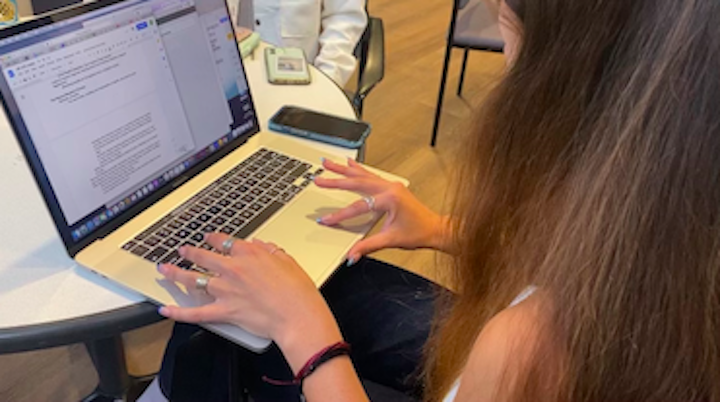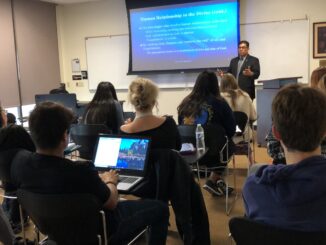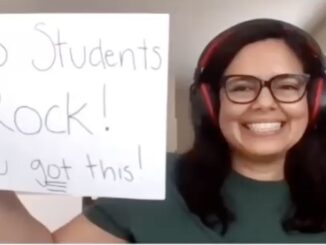
Remote learning made it easier to cheat.
Now that students are back in person, they wonder if that temptation remains.
Six Seaver students reflected on their academic experiences before, after and during remote learning. All agreed that academic dishonesty was common during remote learning as it was harder for professors to hold peers accountable for their actions.
“I know a lot of people that admitted to cheating,” said Madison Fabbian, senior integrated marketing communication major. “Even in-person.”
Students were mixed on whether cheating has declined now that classes are back in person.
In-person classes foster closer relationships that allow professors to push students toward their best work. Students said cheating was not worth damaging that relationship.
Classroom connections raise accountability
Social bonding theory argues that when an individual’s connection to others is weakened or damaged, “deviance or delinquency” will result, Marketing Professor Elodie Gentina wrote for the “Journal of Business Ethics” in 2017.
On the contrary, when individuals are strongly attached to others, committed to a regulated schedule, engaging in social activities, and believing in the “validity of the moral values of society,” Gentina wrote, “they are less likely to engage in unethical acts.”
Without a professor or classmate to watch over their shoulder, remote learning left students disconnected with a weakened bond to their community.
“Everyone was doing it in some way or another,” Carolina Dawkins, first-year political science major, said in reference to her high school experience. “There was no one watching behind your back to see if you were cheating.”
Students are more likely to engage in cheating behavior in an unproctored setting, Jarret Dyer, researcher at College of duPage, wrote in a 2020 article in Journal of the National College Testing.
“There was no one to get mad at them for it,” Dawkins said. “It was just sorta the lifestyle.”
Pepperdine’s Academic Integrity statement appears in the syllabus of every course, promoting strong moral values. Pepperdine’s Student Success Center also offers resources for students to succeed.
Yet students still cheat, often by plagiarizing the work of others.
“The tell-tale sign is when you have a student who hasn’t done well on a paper […] and all of sudden they turn in a beautiful paper,” said Paul Begin, chairman of Pepperdine’s Academic Integrity Committee, associate dean of Curriculum and General Education and professor of Hispanic studies. “And you’re like this doesn’t sound like you.”
This is easier to catch when faculty know their students and their voices. Pepperdine officials take pride in small classroom sizes, with an average class size of 19 students, according to the FAQ website.
Both Begin and Race Skrmetta, a sophomore business administration major, said they don’t see dishonesty as frequently in major classes since the classes are smaller and more unique, yielding a personal relationship between professors and students.
Students value this relationship to the extent they will drop a class if they get caught disrupting the professor’s trust.
“I know that some people, when they’re caught with it, end up dropping the class because their reputation with the professor is kinda like, gone after that,” Skrmetta said. “A lot of people just get a zero and move on with it. “
Their relationship and “reputation was flawed enough for that action to be taken,” Skrmetta said.
Fabbian said a professor accused her of cheating in her first semester at Pepperdine. The Academic Integrity Committee ruled in Fabian’s favor, finding that she did not cheat, and her professor apologized, but it was too little too late.
“I did not like her,” Fabbian said. “I’m very glad that was the semester COVID came because I didn’t have to see her anymore in person because it was super awkward.”
COVID increased cheating
Once Pepperdine moved online, faculty adopted “more positive policies” in light of students’ constant internet access, Begin said. The type of classwork changed: there was a shift away from exams to open-book, collaborative assignments.
Begin said the move to online classes entirely changed how students learn and, therefore, how professors teach.
“Let’s talk more about learning and less about testing,” Begin said. “What matters is that you know the information, whether you know it from learning in class or that you looked it up during the test.”
Integrity violations went down during the pandemic, Begin said, but faculty know the number of violations of academic integrity didn’t truly decline.
“Their ability to prove it and faculty’s willingness to go after it went down,” Begin said. “I think a lot of faculty deal with it on their own with a student.”
Instructors believe cheating happens much less often than students do: meaning they aren’t looking for it, Dyer wrote.
Whether it was to save time, to get more sleep or because they didn’t feel like they were learning anything, students thought cheating took the weight off assignments during remote learning. Their motivation for completing assignments shifted.
“The fact that it was online didn’t give a very serious factor to it,” said Andrew O’Brien, junior business administration major. “It didn’t feel as serious as it would have if the assignment was in person.”
As technology continues to transform learning, “the opportunity for cheating on tests increases,” Dyer wrote.
“We had access to everything,” said Alaina Sio, sophomore sports medicine major.
Begin said faculty tried using monitoring systems like Proctortrack and Turnitin to combat the online resources students had access to during a test. Open-book assignments generated more honest results but, simultaneously, some laziness from students.
Fabbian learned during remote learning that she “could tell when teachers actually read assignments and when they didn’t” she said. “If I got the vibe that they’re not actually gonna look it over, I just put things on the page and didn’t really care about a grade.”
Skrmetta said never meeting his professors during online summer courses influenced how classmates treated their work. The professor caught one of his peers plagiarizing a paper, while another got away with continuously submitting work from a friend who previously took the class. Skrmetta credits this to the fact that professors didn’t know their students very well.
Without the accountability that a professor’s in-person presence brought to students, students said their peers thought cheating seemed more justified and appealing as assignments appeared minor.
“Plenty of people during remote learning would talk about a test or something they have coming up and be like, ‘I don’t have to worry about it; I’m just gonna cheat on it,’” sophomore advertising major Joseph Bowman said.
Cheating was easier, students said
“It was at the palm of our hands,” O’Brien said.
The weight of outside factors took a toll on the quality of students’ work.
“I used COVID as an excuse for not doing my best work,” Dawkins said.
It “definitely” affected how she views work now, leaving her more tolerant of careless work as she continues to make excuses for herself.
“I was so lenient with myself,” Dawkins said.
Begin said there is no good rationale for cheating. He said he struggled to sort through the explanations of students caught cheating: separating which aspects influenced their actions and which they made up.
“I am not jaded,” Begin said. “I try to believe students, but recently it’s definitely been a case where I have caught students trying to pull the wool over my eyes emotionally. Like [they’ll] give me a sob story, and then it turns out it was just covering up, kinda thing.”
Cases rose as school moved back to in-person
The Academic Integrity Committee experienced a boost in cases after the pandemic.
“But that’s just virtue of being in person, collecting a paper in person, maybe even knowing the student better so that when you see the work, you’re like this work doesn’t match prior work,” Begin said.
Students saw their peers struggling to readjust to in person learning.
“They [students who cheated] tried the same mindset of being at home and not having to put a face with your work,” Skrmetta said.
Students said they value assignments that enable them to acquire skills to aid them in the future.
“There’s a reason why you have assignments,” Sio said. “If you can’t do one assignment or exam for your own class, then what are you doing? That’s what you’re here to do. I don’t know why you would need to cheat.”
Students said they don’t mind if others cheat since they believe academically dishonest students will face the consequences in the long run.
“You get what you put into it, so the people that are doing their work will be more successful in the long run,” Fabbian said. “For the people that cheat, it might be appealing now, but in the long term, it’s gonna hurt them.”
Assignments are meant to aid students, yet some don’t want to do them.
“It just depended on each of their motivations for each class,” Skrmetta said. “With a lot of people, if it’s for a GE class, they would [cheat], but for their major classes, they would stay away from it.”
All six students said obtaining a high grade through dishonesty isn’t worth it in the long run.
“Someone else made the mistakes and learned from their errors but got a lower grade, while others just took correct work and got hundreds off of it,” Skrmetta said.
Lily Preis reported this enterprise story in Jour 241 during the Fall 2022 semester under the supervision of Dr. Christina Littlefield and Dr. Theresa de los Santos. Dr. Littlefield supervised the web article.




